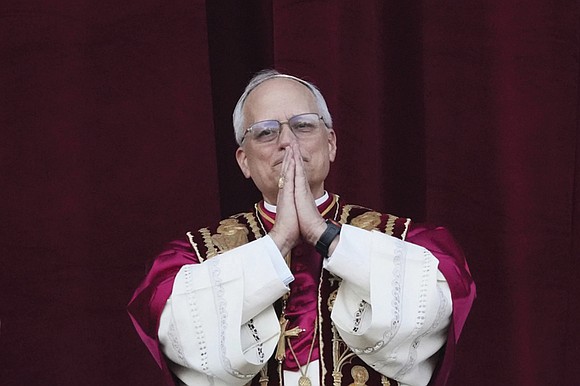The American journey behind Pope Leo XIV’s Haitian lineage
Chelsea Stieber/Religion News Service | 5/22/2025, 6 p.m.

The man who was recently elected pope, Leo XIV, is an American citizen. He also is the descendant of Haitian immigrants who settled in Louisiana in the 1800s. In this, he shares a history that is deeply rooted in the U.S. South and its legacy of slavery, race and citizenship.
Church historians and others have confirmed that the new pope, born Joseph Louis Bernard, is a Creole of color from Louisiana. His family name — Bernard — is one of the most prominent surnames among New Orleans free people of color, especially those with ties to Haiti.
For the past 10 years, I’ve been researching the connections between the Haitian Revolution and free people of color in Louisiana.
This population had a unique migration history. They did not come directly from Africa through the transatlantic slave trade like the majority of Black people in the United States. Instead, they arrived in the U.S. during the French and Spanish colonial periods — often with the status of free people of color — or after the Haitian Revolution, as part of the 19th century immigration of free and enslaved people from Haiti to Louisiana.
This part of history has often been ignored or forgotten, both in Louisiana and in the rest of the U.S. In response to the news of Leo XIV’s election, I began searching through historical records from New Orleans to try to locate the Bernard family. I found an astonishing match in census records and passenger manifests from the 1860s: a Joseph Norval Bernard who immigrated with his parents, Pierre and Adelina, from Port-au-Prince to New Orleans in December 1861.
Joseph was 2 years old when they arrived. He had three older siblings — Michel, 14; Girard, 12; and Adele, 9 — and two younger ones — Alexandre, 4, and Clemence, born shortly after their arrival in 1862. All the children are listed as attending school in census records, an exceptional feat for a Black family living in the South before the Civil War.
While most Haitians arriving in Louisiana in the early 1800s were French speakers fleeing the violence of the Haitian Revolution, this family left Haiti 60 years after the revolution had ended. Their reasons for emigrating are unknown, though Haiti was in the midst of a civil war, and the U.S. offered the possibility of jobs and education — even if the conditions for people of color were discriminatory and often dangerous.
Like many 19th century Haitian émigrés, the Bernard family initially landed in New York. They traveled from New York to New Orleans aboard the steamship Bienville. The ship manifest listed the family’s skin color as “yellow” and their “profession or occupation” as “gentleman” for the men and “lady” for the women — not the kind of work the Bernard family would likely be enticed to take on in Louisiana.
The family arrived in New Orleans at a moment of major political and social upheaval. The city had just come under Union control, and formerly enslaved people were claiming new freedoms and demanding equal rights. The Bernard family became involved in this fight for racial justice and citizenship. Their names appear in the records of the Freedmen’s Bureau, a federal agency created to help formerly enslaved people transition to freedom after the Civil War. They participated in the push for public education and in early civil rights organizing. A major event in this fight was a political meeting of New Orleans Creoles of color in February 1866. The Bernard family is listed in the records of that meeting and may have participated in a related protest and attempted integration of public streetcars in the city. The integration effort was widely reported on, including in Harper’s Weekly, where a political cartoon by Thomas Nast ridiculed the absurdity of color-based segregation.
The Bernards’ decision to emigrate to the U.S. and then to actively participate in the political life of their adopted country — despite persistent racism — suggests they viewed the U.S. as a place of possibility.
This is the story of Pope Leo XIV’s family — and of many Haitian families who chose to migrate to the U.S. and fight for full equality. Their fight continues, in part, through his election as pope.
It is this — and so much more — that makes theirs a truly American story.
This article originally appeared at theconversation.com.






